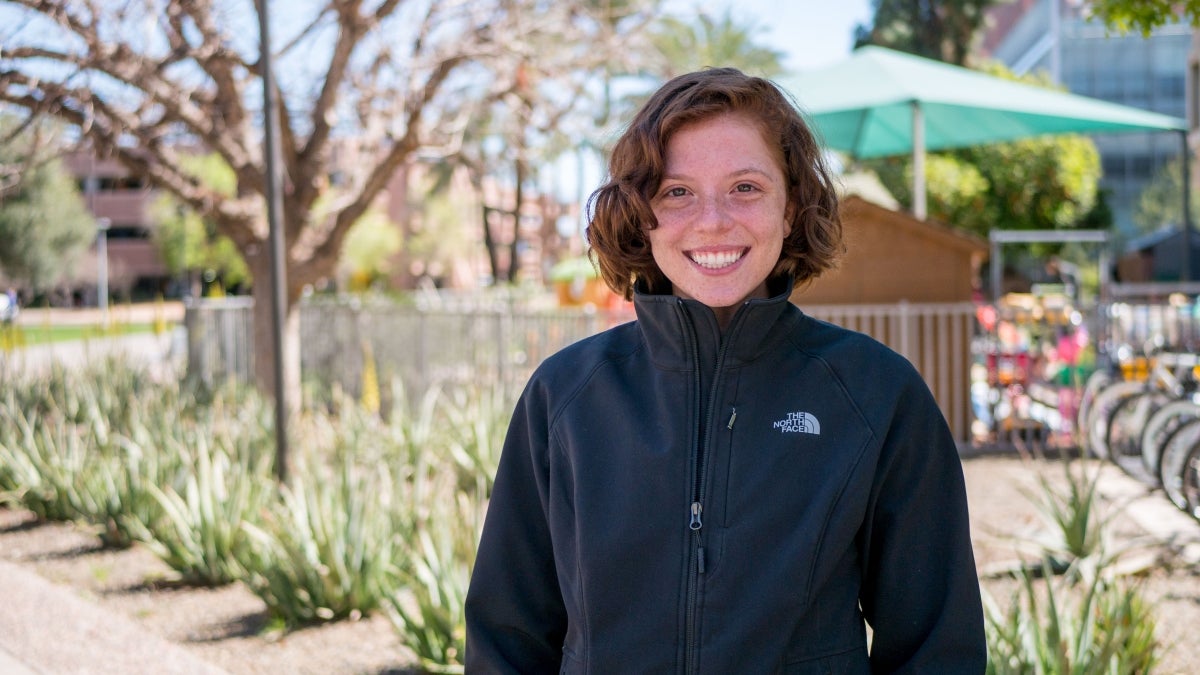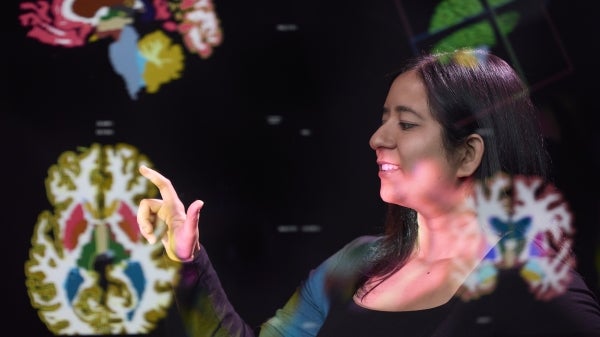ASU student research on reduction in nicotine levels wins AAAS award

Gabriella Cabrera-Brown, ASU Department of Psychology undergraduate who was a winner of the 2018 Student E-poster Competition at the annual meeting of the American Association for the Advancement of Science (AAAS) in Austin, Texas.
According to the Centers for Disease Control and Prevention, tobacco use is still one of the top preventable causes of death in the United States, and the research of one Arizona State University undergraduate seeks to reduce that threat.
Gabriella Cabrera-Brown, a senior in the ASU Department of Psychology and honors student through the Barrett, The Honors College, was a winner of the 2018 Student E-poster Competition at the annual meeting of the American Association for the Advancement of Science (AAAS) in Austin, Texas. Cabrera-Brown presented a poster titled “Abrupt nicotine reduction increases the essential value of nicotine and exacerbates reinstated nicotine seeking.” Her poster stood out among numerous entries from universities across the country, and she won the Brain and Behavior category.
“I felt prepared, which was a good thing because I had seven judges on my panel,” Cabrera-Brown said. “I communicated the importance of nicotine regulation and the global impact it can have.”
Cabrera-Brown’s name and poster title will be printed in Science magazine, and she will receive a recognition certificate and year-long subscription to the journal.
Cabrera-Brown works in the Neurobiology and Behavior Addiction Lab with Cassandra Gipson-Reichardt, assistant professor of psychology. With Gipson-Reichardt, Cabrera-Brown studies nicotine addiction and what happens when the amount of available nicotine is reduced dramatically.
On March 15, the Food and Drug Administration (FDA) mandated that the amount of nicotine in tobacco products be drastically reduced, to near zero levels. The goal of this mandate is to improve smoking quit rates by reducing the nicotine content in cigarettes, which would presumably make them less addictive for both adults trying to quit as well as young people experimenting with cigarettes.
Reducing nicotine levels might seem like a positive step toward combating smoking addiction; however, Cabrera-Brown is studying the effects of reducing nicotine levels on relapse vulnerability in Gipson-Reichardt's lab. Importantly, abruptly reducing nicotine levels to near zero, as opposed to a more gradual reduction, may impact successful nicotine use cessation outcomes. The researchers want to know if an abrupt introduction of less available nicotine in tobacco products translates to lower rates of addiction, which is the goal of the FDA mandate, or if less available nicotine could actually reinforce addictive behaviors.
To answer these important questions, Cabrera-Brown used a mathematical model from behavioral economics to show that reducing the potency of nicotine actually increased the demand for it.
“We found that if you reduce the dose of nicotine, you make it much more likely that the individuals will relapse in the future,” Cabrera-Brown said. “Less nicotine increased relapse vulnerability.”
Cabrera-Brown measured the vulnerability to relapse in individuals when they consumed nicotine at high doses compared to when they consumed nicotine at lower doses. She also looked at how much the individuals valued nicotine at the high and low doses and if that affected whether or not they relapsed.
“We found that individuals consuming a lower dose of nicotine relapsed at a much higher rate. If you abruptly reduce nicotine levels for current smokers, they could have worse outcomes when trying to quit,” Cabrera-Brown said.
Gipson-Reichardt is excited for Cabrera-Brown’s success.
“Winning the E-poster award is very exciting, and her research provides important data that informs regulatory policy by demonstrating preliminary evidence for manipulations to tobacco products,” said Gipson-Reichardt.
More Science and technology

Podcast explores the future in a rapidly evolving world
What will it mean to be human in the future? Who owns data and who owns us? Can machines think?These are some of the questions…

New NIH-funded program will train ASU students for the future of AI-powered medicine
The medical sector is increasingly exploring the use of artificial intelligence, or AI, to make health care more affordable and…

Cosmic clues: Metal-poor regions unveil potential method for galaxy growth
For decades, astronomers have analyzed data from space and ground telescopes to learn more about galaxies in the universe.…